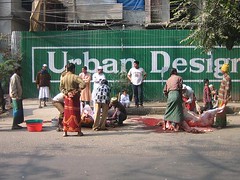Bloody Eid? Bloody Bewdiful!
Rumour had it that the streets of Dhaka would literally be running with blood. I thought this might be a bit of an exaggeration.
The second great festive holiday for Muslims around the world has been dubbed “Bloody Eid” by ex-pats in Bangladesh. And rightly so. In this festival, Muslims get a chance to show their dedication to Allah (and, in some cases, their wealth) by purchasing a slaughter-worthy animal (or choosing one personally reared and loved on the family farm) such as a goat, a cow or a camel, killing it and chopping it up to be enjoyed, in full, by family, friends and the poor.
I decide to get an early start and walk outside to see how true the rumours really are. As it turns out, I don’t have to go very far. I don’t even make it outside the gate of our guesthouse before I’m met with the sight of three goats lined up on the footpath – two sans heads - the blood, redder than paint, dripping out of their open necks into the gutter - and the third being held down for the Imam to say his prayer and make the first lethal incision. As the goat’s hind legs begin flailing I realise this is not going to be an easy day.
Just down the road there are butchers covered in blood up to their necks standing inside upturned, de-bowelled cows in order to get the best angle for the hacking and skinning. Steaming stomachs and intestines wobble on the blood stained street. A few local poor people watch with smiles, patiently waiting for their share. An Imam smiles at me, white Punjabi spotless, face speckled with blood.
Pete Kennedy can’t get enough of the action, snapping photos up close and personal with the blood and intestines. He marvels at the butcher’s skill at skinning the animals. It has obviously created some sort of sense of nostalgia from his days at the abattoir. I think I might have even seen a tear in his eye. Or was that just the pungent odour reacting with his senses?
As the smell begins to waft into the nooks, crannies and nostrils of Dhaka, we decide to escape the city slaughter and head out to a quiet little town called Sonargoan. While the slaughtering is still apparent, it seems to be a little calmer out here. Instead of the barbaric scenes we saw in Dhaka, we’re met with little groups of families happily hacking away at their carcasses. Not one part of the animal is spared, leaving the wild dogs’ mouths watering and unfulfilled. Even the cow’s poo is saved so it can be dried out and used as fuel for fire.
I can’t help but feel for the Hindus today, for whom the cow is sacred.
The next day we escape Dhaka once again to lap up some serenity in Naora. We’ve been invited to lunch at Anju’s house. When we see her that morning she makes us a breakfast of piping hot chappatis. Being the Aussie larrikin he his, my dad decides to teach Anju a little “Australian”. He tells her that the Bangla term for “nice food” (khub shad) means “bloody bewdiful”. After a little practice, Anju perfects the saying with just enough of an Aussie accent to make us all laugh. She also informs us that we’ll be having beef at her house for lunch.
When we arrive, we’re of course given the mandatory snacks, tea and other beverages. This, combined with the fairly sizable breakfast has pretty much satisfied our appetites for the next few hours at least. I try to stall the onset of lunch by suggesting a walk around the village. However, this only leads to yet more tea and snacks being offered at the various relatives’ houses we’ve come to visit.
Back at Anju’s house, we reluctantly go inside to have our plates piled high with rice and huge chunks of the driest, toughest and most gristly meat we’ve ever seen. Not only this, but the three of us are the only ones eating and we have an audience of the entire family watching our every move. As mum picks up massive chunk after massive chunk in an attempt to bite of a piece of edible meat, I hear someone whisper to Anju’s mum (aka the cook), “Mangsho Shockto” (The meat’s tough), to which she retorts, “Na, norom!” (No, it’s soft!).
I can tell mum is finding it difficult to swallow but she manages, through the great piece of gristle wedged in her mouth, to remark, “Mmm. Esh Deleshesh”. Dad backs her up by saying, “Bloody Bewdiful!”. He is rewarded for this by receiving another huge spoonful of meat on his plate.
After what seems like an eternity, and with three plates still half full, we miraculously manage to convince the family that we’ve had enough.
I don’t think I’ve ever seen my parents feel the need to lie quite so enthusiastically in all my life, nor “get the hell out of dodge” quite so rapidly.
Now, just to put the record straight, I’ve been back to Anju’s house for lunch since this frightful day and I even ate beef. Believe me, I was dreading it, but I felt that I had to get back on the horse. And, for the record, the meal really was delicious, and the meat really was “norom”. Wouldn’t want to give my Anju a bad name.

